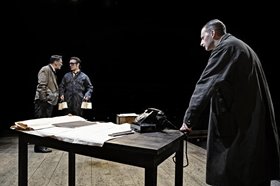First performed in January 1960, Sam Thompson’s Over the Bridge is one of the most controversial plays in Northern Ireland’s theatre history. Fifty years ago, the Ulster Group Theatre’s board of directors refused to produce the play because of its content. However, Thompson and his colleagues successfully mounted a production independently and it was seen by more than 46,000 audience members in its first six weeks. This anniversary production from Green Shoot Productions is a new adaptation of the play by Martin Lynch and reminds audiences of the significance of the play in the canon of Irish theatre.
Set in the 1950s when the IRA Border Campaign was at its height, the play explores sectarianism amongst workers and union members in the Belfast Shipyard. Stuart Marshall’s set establishes many of the themes of the play from the outset, such as the separation of public work places and the private religious beliefs of people’s homes. Using traverse staging, the office space of the shipyard is set in opposition to the living room space of the home, with the area in between functioning as a crossover space, thus suggesting that the boundaries between public and private are not always clear and distinct.
Despite its central theme, the play never succumbs to presenting simplistic binaries of Protestant and Catholics, but exposes the differing perspectives and experiences of the workers in the shipyard and the complexity of their situations. This is demonstrated by the multiple understandings of Protestantism in the play. Unconvinced that his workmate is truly dedicated to his Protestant faith, Archie (Michael Liebmann) refers to Davy (Walter McMonagle) as a “half-baked Prod”, while the preaching of Billy Morgan (also played by Liebmann) is seen as extremist by his co-workers. Meanwhile, the Buddy Holly-styled Ephraim (Matthew McElhinney) signals a much larger cultural sphere beyond  the sectarianism of Northern Ireland. Diana Ennis’s simple yet effective costume design also establishes the diversity of roles in the workplace, clearly revealing power relations, from the overalls of apprentice Ephraim to the slick suit and bowler cap of the boss, Mr Fox (Tony Flynn). The contradictions and complicated natures of Thompson’s characters are fully brought to the fore by members of this strong cast who work well together under the direction of Rachel O’Riordan, with commendable performances from Walter McMonagle, Billy Carter, and Michael Liebmann in particular.
the sectarianism of Northern Ireland. Diana Ennis’s simple yet effective costume design also establishes the diversity of roles in the workplace, clearly revealing power relations, from the overalls of apprentice Ephraim to the slick suit and bowler cap of the boss, Mr Fox (Tony Flynn). The contradictions and complicated natures of Thompson’s characters are fully brought to the fore by members of this strong cast who work well together under the direction of Rachel O’Riordan, with commendable performances from Walter McMonagle, Billy Carter, and Michael Liebmann in particular.
Liebmann is excellent in his roles as both Archie Kerr and Billy Morgan. As Kerr, Liebmann plays a shifty individual who is happy to create trouble by spreading rumours; the realisation that his words are not unconnected to the violent acts of the mob comes too late. The contemporary relevance of such a portrayal is self evident, as many public figures continue to use hateful and discriminatory language, yet distance themselves from violent acts. Meanwhile, Liebmann is also wonderful as the preaching Billy Morgan who argues that his religious beliefs prevent him from remaining as a member of the union. While Billy wanders around the stage, clutching his bible, Rabbie (Frankie McCafferty) waves his union rulebook, each feeling compelled to live by certain rules, no matter what. For Billy, acting in accordance with his individual belief system creates havoc for his boss and for the union leaders.
At times, this is an engrossing and absorbing production. As Billy Carter’s stubborn Peter O’Boyle stands alone onstage, the noise of the approaching loyalist mob gradually increases in volume, creating the most gripping scene in the production. Peter frantically and fearfully weighs up his options, while the mob sing, “Hullo, hullo, we are the Billy Boys” and beat a single drum. Carter is brilliant as the frightened and frenzied Peter, intimidated by the drum and the singing, unable to see a way out. O’Riordan expertly directs this scene, creating a truly chilling atmosphere and revealing the realities of mob intimidation and the fear that drums and chanting can instil in those who do not belong to the group.
Overall, this is a fine and thought-provoking production. It raises a series of questions regarding the role of trade unions in protecting rights and creating unity among workers, while also exposing the challenges of forcing members to conform. The play’s history demonstrates the ability of theatre to ask uncomfortable questions about the society in which we live; the current production reveals that many of the questions raised by the play are as pertinent today as they were fifty years ago.
Pádraic Whyte is a Visiting Research Fellow at the Institute of Irish Studies, Queen’s University Belfast.